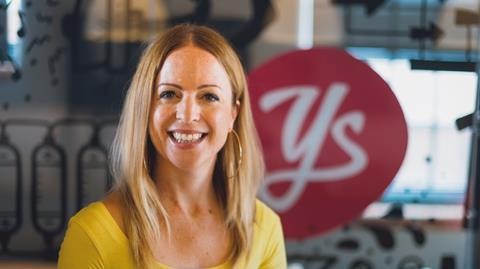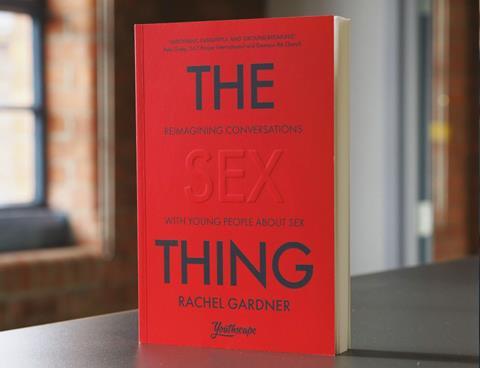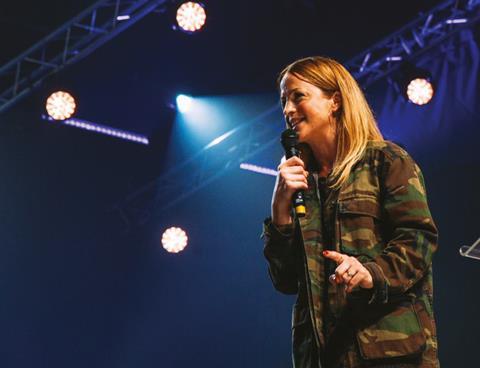Ahead of Valentine’s Day, Rachel Gardner says discussing sex may make us squirm, but not talking about it is far worse

She might be most known for her straight-talking, but Rachel Gardner would prefer people to know her as an all-round Jesus freak. Despite a career that might suggest otherwise, talking about ‘it’ was never the aim, Gardner tells me when we meet to discuss her new book The Sex Thing: Reimagining Conversations with Young People About Sex (reviewed here). “My big thing is Jesus,” she says, “but because my big thing is Jesus, of course I talk about sex and masturbation and eating disorders and exam results and stress and mental health.”
While some of us might rather limit our conversations to the comfortable and the conventional, Gardner is different. With more than two decades of youth work experience and a national profile as ‘the God sex lady’, Gardner is adamant that a real, life-changing faith touches all elements of our humanity. Squirming in our chairs and looking awkwardly at the floor hasn’t exactly worked out well for the Church. From Victorian prudishness to the current backlash against the 90s evangelical purity culture, it seems that the Church’s historical response to sex has been either to pretend its not happening, or to bark orders from the front. For Gardner, that’s a problem.
Today’s teens are dealing with a sexual landscape that many of us older folk may struggle to understand, but with marriage rates at an all-time low, the average age of marriage now in the mid-30s and divorce rates at 42 per cent, there are potentially more adult singles in our congregations than ever before. Gone are the days where ‘managing’ issues of sex and sexuality meant getting the handful of youth in our church through the tricky years between puberty and a wedding ring.
Behind all the talk about nudes and porn, Gardner’s real desire is that the Church becomes a place where holiness, intimacy and integrity are discussed; where all ages are free to experience God’s love without shame or guilt. But that doesn’t make her a liberal lefty. “I’m quite controversial when it comes to masturbation and conservative when it comes to LGBTQ+ relationships,” she tells me. It’s clear that communicating her own personal views are not her main priority either. Instead, it is to help a Church that is often far too embarrassed to talk about the stuff that it needs to.
Gardner and her husband recently relocated to Lancashire, where they are pioneering a youth resourcing church in Blackburn. Alongside her roles as president of the Girls’ Brigade and partnerships director at charity Youthscape, Gardner is the youth innovation lead for the parish. She’s adamant that there’s still work to be done to create a Church culture that can deal with the pressures and problems of modern life, and that includes the messiness of sex.
What inspired you to write this book now?
A church leader said to me: “Helping young people form a Christian sexual ethic feels like the most daunting and difficult thing. Can you help?” And a 17-yearold Christian girl asked me what Jesus thinks about phone sex. And I thought: Oh my goodness, how many adults in church are asking theological questions about things like phone sex?
MISDIRECTED SEXUAL DESIRES ARE CORROSIVE TO OUR CHRISTIAN LIFE BECAUSE SIN IS CORROSIVE, NOT BECAUSE SEX IS MORE CORROSIVE THAN ANYTHING ELSE
In my own life, every day, I know the redeeming grace, patience, kindness and restoration of being in a relationship with Jesus. And for young people, often where that point becomes grounded in their reality is to do with conversations about relationships, sex, sexuality, desire, regrets, shame, fears. That seems to be where the faith they’ve grown up hearing about suddenly gets legs.
Twenty years ago, conversations around sex were very different. But when you peel back the cover, it’s still a person made in God’s image, who needs to feel safe to explore their unique self and their calling to follow Jesus.

In the book, you discuss how the Church can sometimes give the impression that as long as you manage not to have sex outside of marriage, then you’re OK. Do you think the Church has sometimes held too narrow a view of holiness?
The picture in scripture of holiness is incredibly powerful. Paul is audacious enough to say that our bodies are temples of the Holy Spirit (1 Corinthians 6:19); when Jesus takes up residence in our lives, we are holy. And so for Paul, it doesn’t begin with behavioural holiness – which is do the right thing, then you’ll be holy – holiness is the fruit of obedience. It’s like a tree: the trunk is obedience, and the branch is holiness. Sometimes we’ve heard in church that the tree trunk is do the right stuff, and be seen to be doing the right stuff, and don’t do the wrong stuff. And we say that because we know that sin wreaks havoc: I know that lusting after people will cause havoc in my relationship with my husband. But we limit these great theologies of holiness and grace to our own experience of how we would deal with our mess. The wonderful message of scripture is that when we follow Christ, we begin this journey of progressive sanctification which is: the more I discover that I belong to God and realise the difference that being loved makes in my life, the more confidence I have in allowing God to be at work in my life. Bit by bit, I begin to look more like Jesus. My life comes into line with who God says I am.
If we dare say: “Mess up once and that’s it!”, what are we saying about the gospel? I understand why we’ve wanted people to know the boundaries. But rather than thinking: What’s the right thing to believe?, I’d like to say: “What are the right questions to ask now that we know that we belong to God? How do I act out of the truth that I’m loved by God and am free to ask the Holy Spirit to guide me?”
As a young adult, I vowed that I wouldn’t be sexually active before marriage, but I did it for the wrong reasons: I was afraid; I thought it’d make God love me more; I couldn’t cope with these sexual feelings and I didn’t know if the Church was a safe enough place, so I just locked it all down. People would have said: “Oh, she’s really got a good handle on her identity in Christ.” I don’t think I did, actually. So I’d much rather work with a bunch of people that are experiencing God’s grace, because they’re regularly like: “Oh, man, I messed up!” – not because I want them to carry pain into their lives but because the repression and havoc that’s wreaked by simply telling people the rules is just horrendous.
Sin is what we need to be delivered from, not desire
In the book, you talk about the importance of understanding that our desires come from God. As more people begin to talk about the fallout from ‘purity culture’, is this something the Church needs to do better?
A church that thinks: This person is approaching sexual maturation, they’re suddenly interested in sex, the best way to respond to that is to tell them what to do – that’s not going to work! We’ve seen the knockon [effect] of that, which is young Christians who repress their sexual desires get married and struggle to have healthy, loving relationships with their spouse. Sin is what we need to be delivered from, not desire. We need a message that says: “This [desire] is good, now let’s mentor you in a way that it continues to be good for your life.”
For many of us, the way we experienced sexual desires [in our adolescence] was complicated. We were passionately in love with somebody one minute and then somebody else the next. We felt desire for friends of different genders and sexes – and I realise even mentioning this is a difficult line of conversation – but desire is complicated. And the message we receive through TV programmes like Sex Education is: whatever your desires are, you owe it to yourself to act on them. And that is subtly positive, but profoundly confusing, because the nature of desire is complex and wild.
When we experience desires healthily, we recognise we are creatures of desire because we’re made in the image of God, who desires us. The starting point of desire is our God-given nature, but we can direct it in all sorts of ways and become a complete liability to ourselves and others. And so the notion that the only desires God ever wants to talk about are [to do with] genital penetration – it’s just nuts! Our addictive behaviours around pornography are often because we have unmet desires for power, independence, safety, protection, for being able to express who we are. Often, the click/swipe of the extramarital affair is a symptom; we haven’t quite got a handle on our desires.
Young people are best served by a Church that understands that desires are deep and powerful and, ultimately, draw us out of ourselves to desire the one who made us. I share the story of Luke [a same-sex attracted teenager] in the book. The guy that mentored him chose not to make the starting point: “What does the Bible say on LGBTQ+ desire?” but: “Luke, the fact that you have sexual desire is good. And as you grow in your desire for God, let’s wrestle with what scripture says about where to direct those desires.” And this Christian mentor, who held deeply conservative views, enabled Luke to discover what it meant for him. And for Luke, that meant choosing a life of celibacy. For others, it doesn’t.

Issues around sexuality and gender have become particularly contentious within the Church in recent years. How do we deal with that tension?
It’s not the first time in Church history that we’ve been faced with something that feels so defining. NT Wright made a brilliant point about eating food sacrificed to idols (1 Corinthians 8:1-12). The early Church was splitting over this, and so Paul talks about your conscience and the weaker brother. Paul makes it very clear what he thinks. He says: “We are no worse if we do not eat, and no better if we do” (1 Corinthians 8:8). But he also says: “Look at who we are. Christ is saving some of us from that place where [eating meat sacrificed to idols] is enough to trigger them. Of course they’re saved. Of course eating that is not going to undo their salvation. But if it’s hurting them, pay attention.” What would Paul say to us? If you’re in a community where people coming to Jesus are wrestling with gender dysphoria or sexual desire – if you’re heterosexual, cisgender and never had to ask questions about this, but the person next to you is – then I wonder if Paul would say: “You’ve got your conviction. And you know where I stand. But what does it mean for you to really love and understand and wrestle with them?” Paul doesn’t say: “All of you will be agreed on this.” He just says: “You’re a new community, this is a colony of heaven on earth. What does that need to look like right now?”
I’M QUITE CONSERVATIVE, BUT I’M PROGRESSIVE IN TERMS OF PASTORAL CARE
I’m quite conservative, but I’m progressive in terms of pastoral care. I want to hear what it might be like for somebody who holds a different position. What would it look like for us that LGBTQ+ friends, or friends that are wrestling with porn addictions, that [their challenges] become our challenges together? One of the myths we need to bust is that a church is only safe for people if we don’t hold to a historic sexual ethic. I don’t think that’s true. We can be liberal or conservative and hurt people. But if we do hold a conservative view, it’s on us to ask really deep questions, to listen, open our hearts and genuinely journey with friends who are going to bring a different story to us.
You talk about helping young people to put their “God goggles on”, to listen to God and read scripture for themselves. But the Bible also talks about correcting and teaching. What happens when someone’s view is different to what we believe the Bible says?
I say to the young people in our church: “You are always going to be safe, but you might not always feel comfortable. And that’s OK. There’s a difference between safety and comfort.” I think there absolutely is the right space for telling a follower of Jesus what you believe scripture says.
I think the question I’d want to ask is: How can I do that in a way that helps this person love Jesus more? What is my motivation? Am I wanting to say something right now because I’ve got a behaviour holiness thing going on in my head? And we should ask ourselves: How will I respond if they disagree? Are we still leaving the relationship open for them to be able to do that?

In the past, my view of discipleship was that I would sit down with an older Christian, I would say [what I thought] and they would correct me. What we do in our church is model what it means to be a community who are curious about why [someone] might have sexual attraction to the same sex but are choosing celibacy. Or why this person is divorced and says: “I’m not going to be married again.” Create a culture where getting feedback, reading scripture and being challenged by it is modelled all the time, so people are hearing us say: “I really struggle with bitterness. And when I read the Bible and Jesus says to forgive, I find that hard.” Because if the only time young people see the Church wrestling with stuff is around sex, then we’re making sex out to be a bigger deal than it is. I’d love young people to see the Church wrestling with greed, bitterness and resentment. Misdirected sexual desires are corrosive to our Christian life because sin is corrosive, not because sex is more corrosive than anything else.
I would like to see a time where, as leaders, and older Christians, we can hold our own convictions – and own our journey of wrestling with scripture, listening, being challenged, changing our minds – and model to the younger generation that it is a journey. As leaders, we have churches increasingly packed full of people who don’t see eye-to-eye with us. In the past, you could define what people thought about baptism, evolution, remarriage, sexuality, based on what denomination they were part of. That’s increasingly less the case. We’re seeing a generation emerging who are growing up in a world where, if you don’t agree with somebody wholeheartedly, you have to get them out of your life. And the witness of the Church is not going to be: “Yeah, you’re right. In this tribe, we all think the same and we don’t like Christians that don’t agree with us.” What witness is that? But what about a Church that declares: “Jesus is the hope for the world. Our journey is to be more like Jesus. In this Christian community, there might be eco warriors and others that don’t recycle. There’s going to be people who feel passionately about child baptism. There’s going to be people who feel very differently about gender and sexuality. And we’re going to have honest conversations about this stuff. And you’re going to know what I, as the leader, think about this stuff.
AS LEADERS, WE HAVE CHURCHES INCREASINGLY PACKED FULL OF PEOPLE WHO DON’T SEE EYE-TO-EYE WITH US
But our goal, together, is to grow in Christ-likeness, to be challenged and to challenge, and to not have any part of this that’s out of Christ’s domain.” And I think if young people join communities like that, now that’s a witness that says to the world: “The love of Jesus transcends everything.” Your identity, as belonging to Christ, genuinely trumps everything else. Because what unites all of us is that we belong to Jesus.
To hear the full interview, listen to Premier Christian Radio at 8pm on Saturday 12 February, or download The Profile podcast
The Sex Thing: Reimagining conversations with young people about sex can be purchased from Youthscape

































